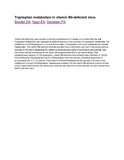| dc.description.abstract | Vitamin B6 deficiency was induced in mice by maintenance for 4 weeks on a vitamin B6-free diet. Tryptophan metabolism was assessed by determining the urinary excretion of tryptophan metabolites, the metabolism of [14C]tryptophan in vivo and the formation of tryptophan and niacin metabolites by isolated hepatocytes. The vitamin B6-deficient animals excreted more xanthurenic acid and 3-hydroxykynurenine, and less of the niacin metabolites N1-methyl nicotinamide and methyl-2-pyridone-4-carboxamide, than did control animals maintained on the same diet supplemented with 5 mg vitamin B6/kg. After intraperitoneal injection of [14C]tryptophan, vitamin B6-deficient mice showed lower liberation of 14CO2 from [methylene-14C]tryptophan and [U-14C]tryptophan than did controls, indicating impairment of kynureninase (EC 3.7.1.3) activity. There was no difference between the two groups of animals in the metabolism of [ring-2-14C]tryptophan. Hepatocytes isolated from the vitamin B6-deficient animals formed more 3-hydroxykynurenine and xanthurenic acid than did cells from control animals, but also formed more NADP and free niacin. | en_US |

